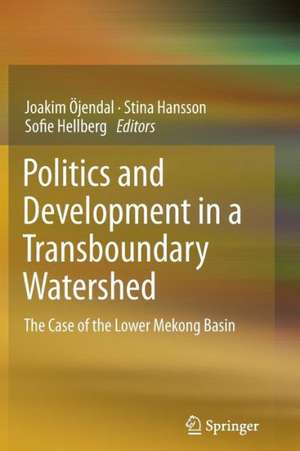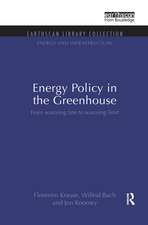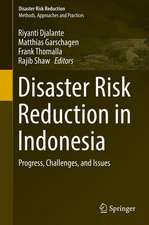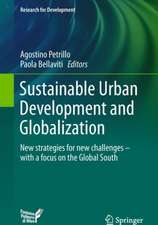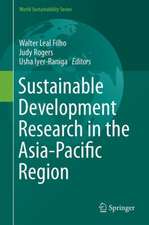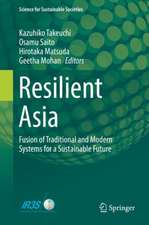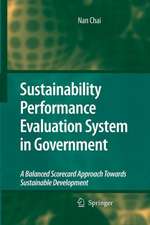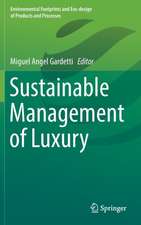Politics and Development in a Transboundary Watershed: The Case of the Lower Mekong Basin
Editat de Joakim Öjendal, Stina Hansson, Sofie Hellbergen Limba Engleză Paperback – 26 ian 2014
Audience: This book will be relevant to scholars, as it provides cutting-edge research, and students, since it covers the primary debates in the field, interested in resource management, regional politics, and development issues in the area. It also addresses the global debate on transboundary water management and presents an in-depth case of one of the globally most sophisticated attempts at pursuing sustainable river basin management. Finally, practitioners and policymakers would benefit greatly because all contributions have explicit policy relevance, launchingsuggestion on improvements in water management.
| Toate formatele și edițiile | Preț | Express |
|---|---|---|
| Paperback (1) | 636.80 lei 6-8 săpt. | |
| SPRINGER NETHERLANDS – 26 ian 2014 | 636.80 lei 6-8 săpt. | |
| Hardback (1) | 641.71 lei 6-8 săpt. | |
| SPRINGER NETHERLANDS – 16 noi 2011 | 641.71 lei 6-8 săpt. |
Preț: 636.80 lei
Preț vechi: 749.19 lei
-15% Nou
Puncte Express: 955
Preț estimativ în valută:
121.87€ • 132.33$ • 102.37£
121.87€ • 132.33$ • 102.37£
Carte tipărită la comandă
Livrare economică 22 aprilie-06 mai
Preluare comenzi: 021 569.72.76
Specificații
ISBN-13: 9789401782746
ISBN-10: 9401782741
Pagini: 224
Ilustrații: XII, 212 p.
Dimensiuni: 155 x 235 x 12 mm
Greutate: 0.32 kg
Ediția:2012
Editura: SPRINGER NETHERLANDS
Colecția Springer
Locul publicării:Dordrecht, Netherlands
ISBN-10: 9401782741
Pagini: 224
Ilustrații: XII, 212 p.
Dimensiuni: 155 x 235 x 12 mm
Greutate: 0.32 kg
Ediția:2012
Editura: SPRINGER NETHERLANDS
Colecția Springer
Locul publicării:Dordrecht, Netherlands
Public țintă
ResearchTextul de pe ultima copertă
Water - and its governance - is becoming a global concern partly because it is turning into a goods in short supply, with devastating effects on literally billions of people, but also because it is the "carrier" of global warming; whether through irregular weather patterns or through flooding, water is how global warming will be 'felt'. The lion's share of the globally available fresh water resources is to be found in transboundary systems. In spite of its significance, the generated knowledge on how to deal with transboundary waters is weak and leaves policy makers with seemingly unavoidable, trade-off dilemmas and prioritizations, often with detrimental effects. In order to disentangle this predicament this volume works with one case: the Lower Mekong Basin and covers state-of-the-art academic and practitioners' knowledge and hence appeals to a wide audience. The topic this volume addresses is situated in the nexus of an IR- (International Relations) approach focussing on transboundary politics and its inclination to remain within the sphere of state sovereignty and national interest on the one hand, and Development studies, with its imperatives on participation, planning, and intervention, on the other. The dilemma, we argue, of better understanding transboundary water management lies in how to understand how these two rationalities can be simultaneously nurtured.
Audience: This book will be relevant to scholars, as it provides cutting-edge research, and students, since it covers the primary debates in the field, interested in resource management, regional politics, and development issues in the area. It also addresses the global debate on transboundary water management and presents an in-depth case of one of the globally most sophisticated attempts at pursuing sustainable river basin management. Finally, practitioners and policymakers would benefit greatly because all contributions have explicit policy relevance, launchingsuggestion on improvements in water management.
Audience: This book will be relevant to scholars, as it provides cutting-edge research, and students, since it covers the primary debates in the field, interested in resource management, regional politics, and development issues in the area. It also addresses the global debate on transboundary water management and presents an in-depth case of one of the globally most sophisticated attempts at pursuing sustainable river basin management. Finally, practitioners and policymakers would benefit greatly because all contributions have explicit policy relevance, launchingsuggestion on improvements in water management.
Caracteristici
Addresses increasingly and critical fields, in research and practice Contributes an in-depth case study which is measured against a general and theorized problem Especially the dominant and idealised IWRM approach to water management needs to be tested against more power oriented IR-imperatives
